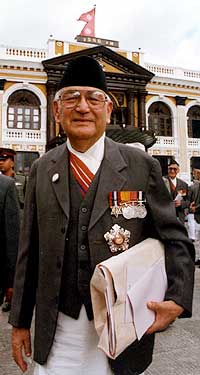 Just when you were beginning to believe the liberal face of the Rastriya Prajatantra Party was fading into the annals of the Pokhara convention, Surya Bahadur Thapa steps in to assert how the country is on the cusp of fundamental change. It's unclear who his anti-regression oratory last week was actually intended for. For the moment, the clear beneficiary is Prime Minister Lokendra Bahadur Chand. It must be difficult to keep the faithful calm when Parasu Narayan Chaudhari has joined Mohammed Mohasin to complete the RPP troika in vital constitutional posts.
Just when you were beginning to believe the liberal face of the Rastriya Prajatantra Party was fading into the annals of the Pokhara convention, Surya Bahadur Thapa steps in to assert how the country is on the cusp of fundamental change. It's unclear who his anti-regression oratory last week was actually intended for. For the moment, the clear beneficiary is Prime Minister Lokendra Bahadur Chand. It must be difficult to keep the faithful calm when Parasu Narayan Chaudhari has joined Mohammed Mohasin to complete the RPP troika in vital constitutional posts. Thapa's insistence that the Chand government isn't the RPP's must be seen in its constructive spirit. Once party activists shed the illusion, the cabinet could start conforming to its individual character. In case you're wondering how such long-time adversaries could so easily bury the hatchet, they haven't. The new RPP president, Pashupati Sumshere JB Rana, boycotted Chand's all-party meeting following consultations with his predecessor. (Those who got a crash course in 18th and 19th century political intrigues during the fiery Thapa-Rana exchanges in the Rastriya Panchayat two decades ago must be particularly anxious to see the two men help the country avoid another accident.)
Regardless of how Thapa's effort to provide an enduring liberal democratic character to the RPP plays out, you can't ignore his words. He's always been close to the centre of action. His first stint at the helm covered the latter half of BP Koirala's eight-year incarceration at Sundarijal. Thapa resigned five months after BP was freed. Some still believe he was forced to pay the price for failing to deliver on his pledge to get BP firmly within the panchayat fold. BP's writings, however, contain a different interpretation of Thapa.
Out of power, Thapa sought to bolster his liberal credentials by focusing on the threat posed by the "dyarchy" of Narayanhity and Singha Durbar that had set in. He landed behind bars in August 1972 and went on a hunger strike to back his calls for political reforms. When nothing happened, many Nepalis began wondering how history would remember him. The only pancha ex-premier to have been jailed by his own flock, perhaps. (Tulsi Giri, too, was imprisoned by the panchas, but that was way before he held the formal designation of prime minister.) Thapa's re-emergence four years later raised hopes of another push for liberalisation. After BP's return from exile in 1976, however, Thapa's line was that the Kangresis were being treated too leniently. BP and Ganesh Man Singh spent time analysing what Thapa's transformation could mean. In his second set of prison diaries, BP preferred to stick to his views of the 60s: "The one element which is apprehensive of an agreement between us and the king is India. So my feeling is that it is a manoeuvre of India through Thapa." ("Back at Sundarijal >26", #129).
The student unrest of 1979 brought Thapa a moment of personal glory. He got the premiership from Kirti Nidhi Bista, whose sustained pressure had driven him out of office a decade earlier. After the panchas won the referendum and the Kangresis boycotted the subsequent elections, Thapa's detractors held him guilty of repeating the same mistake: failure to bring BP into the partyless fold. Over the next two years, Thapa's move to liberalise the panchayat edifice from within put him at odds with the partyless hawks. Nepalis got their first taste of a no-confidence motion, as Thapa insisted that the palace uphold the letter and spirit of the third amendment to panchayat constitution. Out of office, he established himself as the permanent leader of the opposition through his crusade against the "bhumigat giroha".
In December 1989, several weeks before the people's movement began, Thapa counselled the palace to read the writing on the debris of the Berlin Wall. His ascension to the premiership seven years later was another crowning accomplishment. When Thapa issued his nation-is-in-crisis alert two years ago, he couldn't have had a premonition of the national convulsion the Narayanhity carnage would create. His proposal for a broad-based alliance between the palace and parliamentary parties looked good enough for Koirala to plagiarise.
What underpins Thapa's early-detection expertise? The external quarters BP regularly alluded to? Pure political analysis? Or periodic visions from the Almighty? Does it really matter when his record is so robust?


